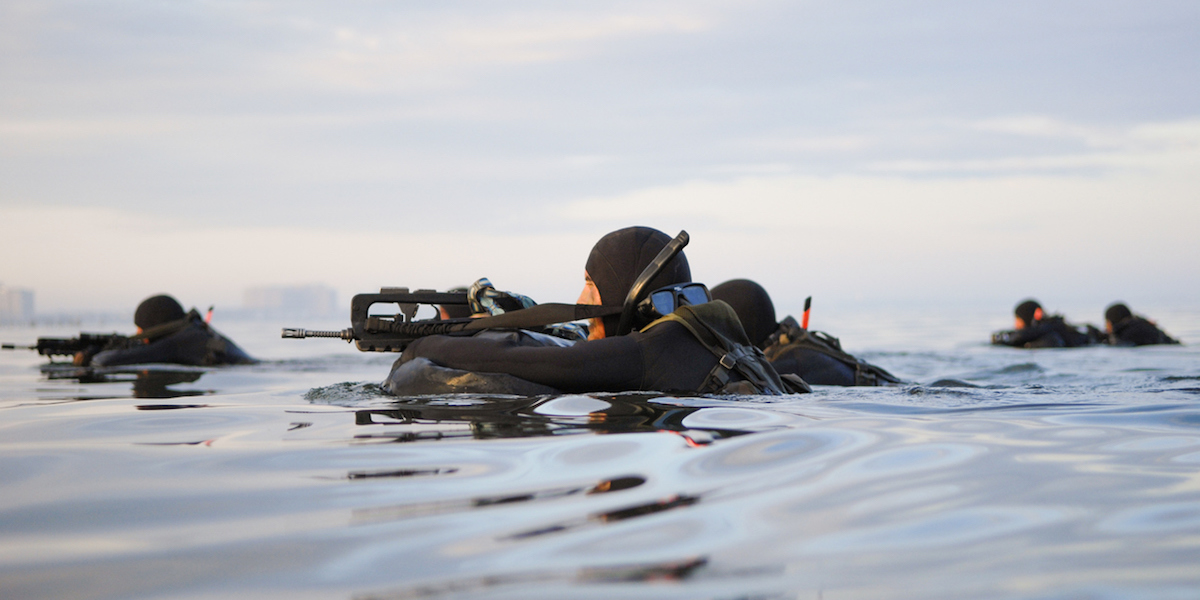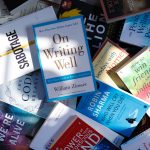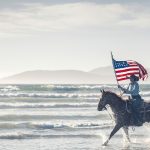READ ON TO DISCOVER:
- How David Goggins ran for 39 hours—nonstop
- Why motivation won’t bring you success
- How to develop lasting mental toughness
David Goggins is the only member of the U.S. Armed Forces to complete Navy SEAL training, the U.S. Army Ranger School, and Air Force tactical air controller training. Having completed multiple ultra-marathons, triathlons, ultra-triathlons, and more, he is considered one of the world’s greatest endurance athletes. Michael Gervais is a high performance psychologist working closely with sports MVP’s, internationally acclaimed artists, and Fortune 25 CEO’s. He recently hosted David on the Finding Mastery podcast to discuss how David pulled himself out of a deep depression, took charge of his own life, and became perhaps the hardest man on Earth.
Michael: I want to start with what it was like when you were growing up. What was that environment like?
David: David Goggins was the kid that was bullied, that had an abusive father, that didn’t go to school, whose soon-to-be stepfather got murdered. Mentally, physically, emotionally, spiritually, I had nothing.
I was blaming everybody for how I came up. [But] I realized instead of feeling sorry for myself, I had to say to myself, “The only person that’s going to control your destiny is you, and what you have to do is change the way you think. Instead of being a victim, you need to say, ‘Thank you God for giving me this life, because now I’m going to turn it upside down.’”
The challenge to be great was hard for me, but that’s what I needed. Instead of looking at my life as, “Oh my God, I graduated 213 out of 214 in my class, and the KKK marched on a 4th of July parade,” I said, “If I can become the hardest man God ever created, that will mean something. I will become relevant in my own mind.” And that’s what I did. I just changed the way I thought.
I said to myself, “You know what, I’m going to be the hardest guy God ever created. I’m going to set this journey out to be me, and wherever that ends up, that’s where it ends up.”
Michael: Why “hard”? Why is that the virtue that you care so much about?
David: I care so much about it because growing up, I honestly believed I was the softest human being that God ever created. I was beat down mentally, I had zero self-esteem. You can lie to other people all day long, but you can’t lie to yourself. Every morning at 16 years old I would look in that dirty mirror and all I saw was a liar. I saw a weak human being, and all I wanted to do was change the reflection in that mirror.
Michael: You couldn’t, you didn’t know how.
David: Well, I didn’t have the courage.

Michael: Okay, so how do you have the courage to change?
David: You have to find out what you truly want in life. You have to believe in something, whether it’s God [or] yourself. You have to believe that you have control of your life. I was scared to be a SEAL. I didn’t want to jump out of an airplane, but I didn’t want to live knowing I was scared to be great.
Michael: I think that courage can be developed, and the way that you develop courage is putting yourself in challenging situations and choosing to act nobly. Doing the thing that is difficult to do for a greater cause, that’s how you build courage.
David: Exactly.
Michael: Do you want to be the best, the hardest in the world, or do you want to be rock solid within yourself? Are you trying to be the best or your best?
David: I’m trying to be my best. When I say, “I want to be the hardest person in the world,” that’s what got me off the couch. The best conversation you are going to have in your entire life is the one you have with yourself. I became who I am today because I looked at myself in the mirror and said, “Hey, you are acting this way, you are not real smart, you are this, you are that.” I gave myself who I was. Who I was was not a pretty picture, but I had to admit who I wasn’t.
Michael: How did you have that conversation?
David: Every morning, when I would wake up to shave my head, I would reflect on the day before. To stop lying, you’ve got to tell yourself that you are lying. I had to look at myself in the mirror and say, “Okay, today I’ve got to change this because yesterday you did this.”
“You can lie to other people all day long, but you can’t lie to yourself.”
I call it “the accountability mirror.” I started holding myself accountable for everything I was afraid of or I lied about or I cheated on or whatever because I had to develop a core value of myself. I had to believe in myself, and you can’t believe in yourself if there is nothing substantial inside your heart and your soul. If there is nothing there, you mean nothing.
Michael: Was your center rotten, or were you just focusing on the things that were flawed based on the way society thought you should think?
David: Both. I started believing what they were saying, but I gave myself excuses to be that: my dad was this, people don’t like me, I’m not real smart, all this. I developed this [mindset] because my life was bad, [but] I had to stop blaming my family and stop blaming other people for my [messed] up life. They are not going to change it. I’ve got to fix it.
Michael: I fully hear you on that. Each person has to make their own decision about who they are and where they are going. Until you make that fundamental decision, we’re constantly looking for shortcuts and hacks, [going] along for the ride as opposed to dictating our experience in this life. Your decision was that you are going to be the hardest man alive. What is the essence of being hard?
David: For me, it’s to face yourself, to face fear. Everybody asks me, “How do you develop mental toughness?” How you develop mental toughness is becoming hard, and how you become hard is doing [stuff] that you don’t want to do. Most people live in this nice, comfortable place that makes them feel really good; the temperature in the house is 72 degrees, they’ve got a refrigerator full of food. Everything is great, and they always ask, “How do I become hard?”
You sure don’t become hard by living that way. You have to take yourself out of your comfort zone. Bury yourself in something that makes you feel so horrible that you see how your mind is thinking, and overcome it. That’s what makes a human being hard.
Michael: The only way to build resilience is doing difficult things.
David: Exactly. I had to do all of that stuff so I can sit back at 41 years old and say, “Now I’m proud of myself.” Some people don’t need to do all that, some people don’t need to do a fraction of that. [But] I believe that you are not doing enough if you are content with a life where you just go do your job and you have nothing to look back on and say, “Wow, I overcame a lot of things.” I think you are really cutting yourself short.
Michael: Of all the things you’ve done, can you give a list of your greatest adventures so far?

David: I’ve run 205 miles at one time. I did eight hundred-mile races in eight consecutive weekends. I ran over 7,000 miles 2007, I had the Guinness Book of Records for the most pull ups in 24 hours with 4,030 in 17 hours.
With all that being said, it was the whole journey. Everything I said I did, I truly did not want to do, [but] I did it because I wanted to better myself. I didn’t want to sit back and say, “You know, I’m happy with where I’m at.” I wanted to be great.
Michael: When did that transition happen [from,] “If I could just do this XX miler, I’ll be okay,” to being able to say, “Wow, hold on, I actually don’t need to do an XX miler again to demonstrate that [I am] a man that I love.” Because [so much] of the world [thinks,] “I need to achieve to be okay.” So many of us are caught in that rat race.
David: It’s a good question, and for me, I started realizing that you need nothing but the breath in your lungs to become great. Once I started pushing myself to different limits, I realized it just takes changing how you think about situations [to become great]. Life became more than, “I want to become this to make myself feel better.” It became, “I’m on a journey now. I’m about to see how great I can become, how far I can go.”
After I realized that we’re just breath and a healthy heart and a mind that’s willing to change your circumstance, I realized, “Okay I feel good about myself. Now let’s go conquer the world.”
Michael: How do you do that? How do you fundamentally change your belief system that you are great?
David: People don’t know how to do it because people don’t truly want to do it. That’s why people say, “Hey Goggins, how did you do this, and how did you lose a hundred pounds in 60 days?” Well, you are asking me how, [and] you are already wasting your time. You’ve got too many questions already.
You have to be driven. Motivation is crap, motivation comes and goes. If I motivate you right now to go run two miles and it’s 20 degrees out in Chicago, you may open your door and say, “It’s cold,” and go back inside. A person that’s driven will open the door and say, “I’m putting gloves on. I’ve got to get running.”
Change your mind to believe that [you] need to be driven. But what drives you, only you can answer that. What drove me was, “I’m going to become better than what I am today.”
“You need nothing but the breath in your lungs to become great.”
Michael: I love it. You know what makes my hair stand up in a bad way is that people go, “Mike, you do motivational speeches.” Motivation only lasts moments. What I’m trying to unlock for you here is a fundamental decision [to] reorganize your life based on what you are most hungry for.
How do you negotiate those physically overwhelming challenges?
David: I will tell you how I do it exactly. I’ve gone 205 miles in 39 hours nonstop running around a one-mile track. Let’s picture this. Here I am at mile 100, I have another 105 miles to go, and I hate running. What I’m thinking is, “I need to bag this race. My body is aching, I feel like shit, I want to go home.” That is the realness of the situation. So you’ve got to break big things up into small pieces, take it in small pieces versus 105 miles.
Hell Week [for SEALs] is 130 hours of continuous training. They put you in the coldest water that you can possibly imagine, and what happens to your brain is you lose control of your thought process. You immediately think, “It’s only been one hour, I have another 129 more hours to go and this is the coldest I’ve been in my life.” Now that I’ve been through so much, I already know what I’m going to think about. I’ve thought about quitting too, but you’ve got to think about, “How glorious would it feel once I graduate.”
Michael: Do you think you needed all of the achievements that you’ve had to find peace, or did it somehow emerge along the way that peace is really what you were searching for, not accomplishment?
David: Peace is what I was searching for, but I had to suffer. I had to earn the right to be on this planet. A lot of us think that we are just born and we live and then we die. No, it’s not that easy.
I truly believe that you have a path and a journey that you have to start. It’s not about the accomplishments, it’s about starting a journey, and not getting off that path when it gets scary. Getting scared and suffering allowed me to be proud and have peace in my life, to know that I’ve endured. I didn’t run. I endured.
Michael: Can you just take one more quick riff on how you think about mastery?
David: I believe that God put us all down here, and we are all artists. Some people think an artist is a person that paints a picture. I believe an artist is a person who is painting their life. You are trying to paint your greatest masterpiece.
You have to paint that masterpiece to the best of your ability, and you have to go through a lot of brushes and a lot of canvas. That journey is hard, [but] you are your own master.
This conversation has been edited and condensed. To listen to the full conversation, click here.



























